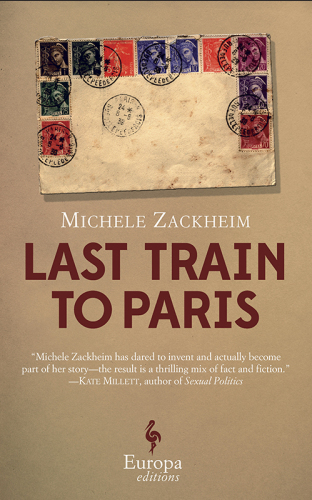
The Last Train to Paris
کتاب های مرتبط
- اطلاعات
- نقد و بررسی
- دیدگاه کاربران
نقد و بررسی

January 20, 2014
Loosely based on the real-life kidnapping of the author's distant relative, Zackheim's latest novel is set in 1937 in Paris on the brink of WWII. Rather than focus on the victim of the crime, the story centers on her cousin, Rose Manon. Rose is a serious young woman who escapes her dusty Nevada roots to become a working journalist. She loves the rhythm of putting pen to paper and using words to make sense of the worldâthe "thrill" of turning a page to find her byline: "R.B. Manon." But all is not fun and games even as her career as war correspondent picks up; she is in-and-out of love with the tortured Leon, her cousin Stella has come to Paris and promptly been kidnapped, and Hitler has risen to power in Germany and, as a result, Rose most conceal her Jewish roots. Despite these compelling circumstances, the novel feels sketchy and light in a way that dampens its suspense. Key characters, like Stella lack the fullness of real-life people. At times the prose is lovely and precise and at other times it is rushed into cliche. Still WWII enthusiasts may appreciate this quieter evocative look at a much-examined era.

December 1, 2013
More than 50 years after the events recounted, a reporter reminisces about her life in Europe prior to the outbreak of World War II. Although, or perhaps because, she was born and raised in Nevada, Rosie Manon craved another kind of life--more adventurous and meaningful than the one she'd known as a child. Her father was Catholic and her mother Jewish, although the latter lived in denial of her religious background and tried to keep Rosie from this part of her identity. In 1933, after a stint as a reporter with the New York Courier, Rosie seeks a transfer to its Paris office and finds herself the only woman on the staff and particularly ill-treated by her editor, Ramsey, an intolerant bigot who nevertheless recognizes Rosie's talent. She styles herself R. B. Manon and becomes a tough-skinned reporter, eventually moving to Berlin, obviously a perilous place for her. There, she falls in love with Leon Wolff, a gifted engraver (and forger of documents) who, against his will, uses his talents on behalf of the Reich. Rosie and Leon carry on a surreptitious affair, but life eventually gets too dangerous, and Rosie reluctantly moves back to Paris. One sidelight of her life involves the murder of her cousin, Stella, the daughter of Rosie's beloved Aunt Clara, and Rosie's reporting on the outcome of the trial. Rosie lives through the horrors of Kristallnacht and, two years later, through the fall of Paris, losing track of Leon and only toward the end of the novel, after the fall of the Berlin Wall, finding out about his time in Sachsenhausen concentration camp and his postwar life with another woman. Despite some occasionally wooden dialogue, Zackheim gives us a poignant glimpse into the tensions and anxieties of prewar Europe.
COPYRIGHT(2013) Kirkus Reviews, ALL RIGHTS RESERVED.

January 1, 2014
This engrossing, historical novel from Zackheim (Violette's Embrace) has the feel of a memoir. This may be partly because she based it on an incident involving a German national's abduction of a distant cousin in 1937. Rose "R.M." Manon is a crack American reporter in prewar Paris when a cousin from the States is murdered during a visit to the City of Light. The accused murderer's trial is attended by R.M. and such luminaries as Colette and Janet Flanner in cameo appearances. Also attending the trial is, of all people, R.M.'s mom, with whom she has a tortuous relationship that is intertwined with issues of Jewish identity. That relationship even threads its way through the journalist's love for a Berlin Jew who is forced to work for the Nazis so he and his family can survive. Though Zackheim does not identify it as such, her depiction of Kristallnacht is one of the most chilling this reviewer has ever read. VERDICT The author revivifies the drama of the interwar years and convincingly relates these historical events to a very personal albeit fictional narrative. Highly recommended to readers interested in women's issues, the history of the era, and the Holocaust.--Edward B. Cone, New York
Copyright 2014 Library Journal, LLC Used with permission.

























دیدگاه کاربران